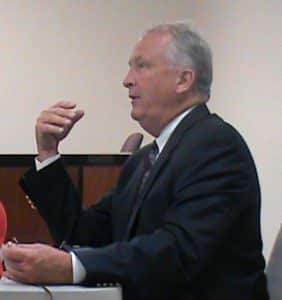News
DeKalb EMS Receives Donation from MTNG Project Hometown Help
May 31, 2023
By: Dwayne Page
The DeKalb County Ambulance Service recently received a $2,000 donation from Middle Tennessee Natural Gas Utility District through “Project Hometown Help.”
Assistant DeKalb EMS Director Trent Phipps accepted the donation on behalf of the ambulance service from Mike Corley, General Counsel for Middle Tennessee Natural Gas.
DeKalb EMS Director Hoyte Hale said the ambulance service is grateful to MTNG for this donation.
Funds from the Hometown Help voluntary program come from an automatic rounding up of participating customers’ bills to the next highest whole dollar amount. This funding is used to advance education, assist economic development, promote local charities, and provide relief to the disabled and elderly for payment of natural gas bills.
DeKalb Prevention Coalition Announces Mental Health First Aid
May 31, 2023
By: Dwayne Page
The DeKalb Prevention Coalition, in partnership with the Tennessee Tech Addiction Prevention & Support Coalition will be hosting a Mental Health First Aid (MHFA) Course on Wednesday, June 14 from 8 a.m. until 5 p.m. at the DeKalb County Community Center.
The training will be provided at no cost to the participants thanks to a grant from the Tennessee Center for Rural Innovation’s Rural Reimagined Grand Challenge Faculty Grant Program at Tennessee Tech University.
Just as CPR helps you assist an individual having a heart attack, Mental Health First Aid helps you assist someone experiencing a mental health or substance use-related crisis. In the Mental Health First Aid course, you learn risk factors and warning signs for mental health and addiction concerns, strategies for how to help someone in both crisis and non-crisis situations, and where to turn for help.
Mental Health First Aid, an evidence-based training designed by the National Council Mental Wellbeing, is a course that teaches you how to identify, understand and respond to signs of mental illnesses and substance use disorders. The training gives you the skills you need to reach out and provide initial help and support to someone who may be developing a mental health or substance use problem or experiencing a crisis.
Bates Warns Budget Committee of Consequences if County Property Taxes Are Not Increased
May 29, 2023
By: Dwayne Page
The county budget committee will soon be ready to send to the full county commission its recommendation on a property tax rate and spending plan for all departments with the start of the 2023-24 fiscal year.
Another meeting is set for Tuesday, May 30 at 6:30 p.m. in the first-floor courtroom of the courthouse and other meetings could still be scheduled as the committee ties up some loose ends. The committee still has to act on the proposed Road Department budget once its presented but perhaps the biggest challenge facing the committee is recommending a property tax rate that will adequately fund county government.
According to the county’s financial advisor/fiscal agent Steve Bates, the current property tax rate of $1.7308 cents is no longer sufficient. Bates is recommending that the county increase the tax rate by almost 27 cents (.2692) to $2.00 per $100 of assessed value and that all the increase go into the county general fund.
Although the budget committee has made significant cuts in spending requests from department heads for the proposed 2023-24 budget, Bates said a tax increase is inevitable due to inflation and other factors that have taken a toll on the county general budget in recent years.
“I don’t see any way around it (property tax increase) with the budget the way it is,” said Bates at the budget committee meeting on Thursday, May 25. “You have a lot on your plate and inflation over the last two years has been running at more than 8% per year so that is 16% over the last two years”.
“The general fund is mostly made up of salaries and the other remaining items are unknowns,” Bates continued. “For example, you could collect more in patient charges than budgeted for the ambulance service or you may not spend as much. Public safety may not spend everything budgeted. There is really no way to tell right now but if you (budget committee) feel comfortable you won’t spend everything you are budgeting (overall) you can tell me what you think that number is but for now I don’t have a good feel of how much you budgeted that you won’t spend,” he said.
Another concern is the jail. Should the Tennessee Corrections Institute decertify the basement cells, Sheriff Patrick Ray would have to relocate several inmates (most likely females) to other jails immediately. As of last Thursday, that number was 17 and given that number multiplied by the $55 cost per day of housing an inmate, the expense to the county could be more than $340,000 per year but that would fluctuate during the year until a new jail or justice center is built.
Budget committee member Larry Green suggested perhaps figuring the property tax collection rate at 96% or 96.5% rather than the current calculation of 95.5% with a 4.5% delinquency.
“Changing that collection rate by half a percent would recognize estimated collections to the general fund at $40,517 more but it wouldn’t make much of a difference overall,” said Bates.
“So that doesn’t get us down to having less of a property tax increase,” asked Green.
“No” replied Bates.
According to Bates, one cent of the property tax rate is projected to generate around $60,000. “You would need to make $60,000 in budget cuts to match one cent on the tax rate. If you want to save three cents, you will need to cut $180,000 and I don’t know where you are going to do that in this budget,” said Bates.
Without altering the scheduled step wage increases for departments, Budget Committee Chairman Jeff Barnes said one option for cutting might be splitting the proposed 5.24% pay raises for county employees in half which would save the county about $160,000 but Barnes stopped short of recommending this proposal and admitted that it would not set well with many and it might mean losing some officers and other employees.
Sheriff Ray, who attended the meeting, said he doesn’t understand why the committee would even consider cutting pay increases for employees while at the same time giving more money to some non-profit groups.
“I don’t understand why you give money to nonprofits when you are taking away from your employees. That doesn’t make any sense,” said Sheriff Ray. “Before you do that (cut pay raises to employees) I would like the chance maybe for all the office holders to go back and see if we can cut something out of our budgets,” said Sheriff Ray.
Committee members seemed unwilling to tackle the salary issue and took no vote.
Green suggested that the committee should also look at cutting the $5,000 contribution to WCTE to help fund a televised portion of the Fiddlers Jamboree. Again, no vote was taken on that matter at the Thursday meeting.
According to Bates, funding county general another year without more revenue would be risky.
“If you don’t raise taxes in the general fund and you leave it as is, you will go into cash (reserves) by $1,626,268 and end cash with $2,127,261 by June 30, 2024, said Bates. “If you don’t raise taxes this year and wait until next year then by the time the tax levy is passed, and tax notices start to go out in October you won’t get any tax receipts until February or March 2025. I would just about bet that by December or maybe even by October 2024 you would probably have to go to the state to do a tax anticipation note because you would not have enough cash on hand to meet payroll or you would be cutting it close. Either cuts need to be made or revenue has to be raised,” said Bates.
Strong fund balances also help support the county’s A1 bond rating according to Bates. “Fund balance (cash reserves) is a percentage of expenditures and if you don’t do anything (tax increase) its going to be 17% by June 30,2024 which is below the 25% we’ve always told the bond rating agencies you would maintain. If you drop below 15% you will have to start doing cash flow analysis studies to the comptroller’s office and then you’ll have to do tax revenue anticipation notes for the funds that have a cash flow less than 15% of expenditures,” said Bates.
Budget committee member Beth Pafford asked if an allocation from the capital projects fund could be set aside for future construction of a school or jail and if annual funding for such needs as patrol cars could be redirected from capital projects to the general fund.
Bates said funding for such long-term projects like a school or jail should be payable from debt service and not capital projects, which is designed for short term or one-time expenses.
“There was a time before the capital projects fund was implemented that every time the county needed patrol cars, for example, they (county) wound up going to a local bank and do a three-year capital outlay note. You should not have to do that. This was the reason we started the capital projects fund. It was to pay for things like cars, etc. through cash management without having to pay interest on a short-term note. Under this practice, the general fund and capital projects funds stand on their own so that if a capital outlay purchase is needed for a specific department, all the available funds budgeted from the general fund for that department don’t get absorbed for other things. The needed purchase can be made directly from the capital projects fund. As for large long-term projects, you are typically not going to pay cash for something you are going to issue debt for. If you are going to issue debt, that is payable out of the debt service fund,” said Bates.
After the budget process for the year is completed, Bates suggested that the county develop a five-year capital improvement plan. “I would also recommend that the county put in writing a fund balance policy for the general fund. You already have a policy for the debt service fund and a debt management policy but that is probably something you need to look at again because I am sure it is dated,” he said.
Bates also urged the budget committee to start thinking about whether and when to build a new school.
According to Bates, revenues (local option sales tax) to the local purpose tax fund for schools (which cannot be transferred to other county departments) is exceeding expenditures this year by $2,090,161. The fund has accumulated around $10 million. “To the extent collections come in over that, this fund will increase exponentially until the contracts between the city and county expire. That is why you need to start considering what you are going to do about schools. For example, if you wanted to build a school for $40 million, you could issue $30 million in bonds and take $10 million out of this fund,” said Bates.
Half of the county’s share of the local option sales tax revenue goes to schools and the other half helps fund the solid waste department.
Since 1968, the City of Smithville, by agreement with the county, has given two thirds of its local option sales tax collections to the county’s local purpose tax fund to help pay for construction and other school capital outlay projects. That agreement was renewed for 30 years in 2007 and is set to expire in 2037 unless the agreement is again renewed between the city and county. The city is legally obligated to turn over to the county 50% of its local option sales tax collections for education purposes, but since 1968, the city has been contributing 16 2/3% more than it’s required share for a total of 66 and 2/3%.
The county annually transfers to the school district $1,540,000 from the local purpose tax fund (local option sales tax) to the general-purpose school fund for yearly operation. A total of $449,465 is also transferred from the fund to debt service to meet payments on long term school bond debt.
As for the general fund, the budget committee Thursday night took no action on any further budget cuts and has not yet made a final decision on whether to adopt Bates’ property tax increase recommendation.
If approved as recommended by Bates, the county property tax rate would break down as follows:
County General: $1.2583, up from the current level of 0.9891 cents
Highways/Public Works: 0.0326 cents (no increase)
General Capital Projects: 0.0733 cents (no increase)
Debt Service: 0.1060 cents (no increase)
General Purpose Schools: 0.5298 cents (no increase)
Total proposed tax rate: $2.00, up from current level of $1.7308 cents.
« First ‹ Previous 1 331 421 429 430 431432 433 441 531 2456 Next › Last »













